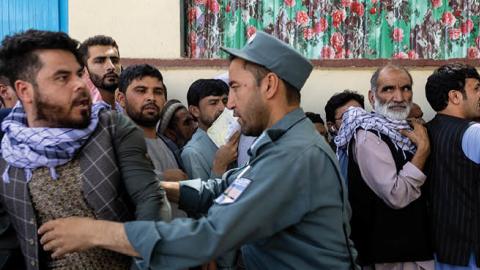Whether President Biden acknowledges it or not, the debacle in Afghanistan has undermined U.S. prestige as a superpower. America’s credibility as an ally has eroded because of the manner in which the Afghan government was abandoned during the Doha talks. The fear of the U.S. among its enemies has also diminished.
If the American Embassy in Kabul is attacked at some point, Biden could end up looking, in his first year, a lot like Jimmy Carter did in his final year as president.
The Taliban took Kabul without much of a fight, just as they did in 1996. They had left the city under similar circumstances in 2001, when U.S.-backed forces challenged their brutal rule in the aftermath of 9/11. Melting away is what militias do in Afghanistan when they see their side is losing.
But what is happening in Kabul will not stay in Kabul. Radical Islamists, armed with the powerful narrative of driving out two superpowers through jihad, will challenge the American-led order across much of the Muslim world, from Morocco to Indonesia.
Although the U.S. is better prepared to deal with terrorism now than it was on 9/11, a revival of global jihadi terrorism must be expected.
Both Presidents Trump and Biden made the mistake of making foreign policy on the basis of a bumper sticker, “No Forever Wars.” Their domestic political compulsions are understandable. But the withdrawal did not have to be as chaotic as it became.
There was no need to bypass the Afghan government in negotiations, eroding morale of its forces, or to suddenly withdraw U.S. contractors who helped keep the Afghan Air Force flying.
In the end, the U.S. had to send marines to Kabul to secure evacuation of American personnel, showing the futility of the negotiations with the Taliban that reflected a poor understanding of the enemy.
Getting out of wars entails intelligences and planning as good as is needed to get into them.
The Trump and Biden administrations engaged in talks with the Taliban, ignoring warnings that the Taliban’s worldview is incompatible with reconciliation.
Moreover, with an intransigent enemy like the Taliban, military withdrawal should not have preceded a political settlement. Support for America’s Afghan allies should not have been withdrawn without a cease-fire.
The Taliban’s victorious march into Kabul is worse than the fall of Saigon. Then, the Vietcong and the North Vietnamese waited for two years after the departure of U.S. forces before occupying the capital of South Vietnam.
National security adviser Henry Kissinger had successfully negotiated what he called a decent interval between an American withdrawal and the collapse of South Vietnam.
The Taliban has not afforded current American negotiators that courtesy. Given the scale of their military offensive, it is obvious that the Taliban were preparing for war while pretending to discuss peace in Doha.
The entire episode sets the stage for a diminution of America’s diplomatic clout. U.S. diplomats were reduced to “urging” the Taliban, via Twitter, to reduce violence. That envoys of the mightiest nation on Earth can be duped and its leaders ignored so easily will encourage others to engage in similar duplicitous diplomacy.
Diplomacy not backed by potential use of force is tantamount to skating on thin ice. The Taliban did not care about international legitimacy as much as Biden’s team thought they did.
Having maneuvered American military withdrawal, China, Russia and Pakistan have little reason to keep their word about not recognizing a Taliban regime established by force. They will probably cite the lack of battle in the fall of Kabul as justification for recognition, dealing a further diplomatic blow to the United States.
In their eagerness to withdraw from Afghanistan, two successive presidents refused to respect the views of America’s ally, the government of Afghanistan. That does not send a great signal to America’s allies around the world.
American allies will now have to worry that the U.S. can abandon them at short notice for domestic political reasons — not a good reputation to have while preparing for peer competition with China.
Equally important is the impact of the Afghan endgame on America’s “frenemies.”
Successive U.S. administrations have consistently accused Pakistan of harboring Taliban leaders, facilitating their finances, offering hospitalization to their injured and allowing them to arm, train and operate across the border. Pakistan has as consistently denied these allegations.
If the U.S. charges were unfounded, America loses believability. If, however, the U.S. is convinced of Pakistan’s role in Afghanistan but failed to inflict any consequences, it has set a bad precedent.
Other middle-sized countries ostensibly friendly with the U.S. could also undermine U.S. policy without fear of paying a price. Blaming wrongly requires expression of regret; Blaming with reason demands retribution. Not doing either diminishes America’s position as a global power that others must respect or fear.
Having failed to manage its exit from Afghanistan well, the U.S. must now focus on the second order consequences of its disastrous endgame. It should guard against a revival of Islamist terrorism, reassure frustrated allies and figure out a way to restore credibility as a great power.
Read in The Hill















